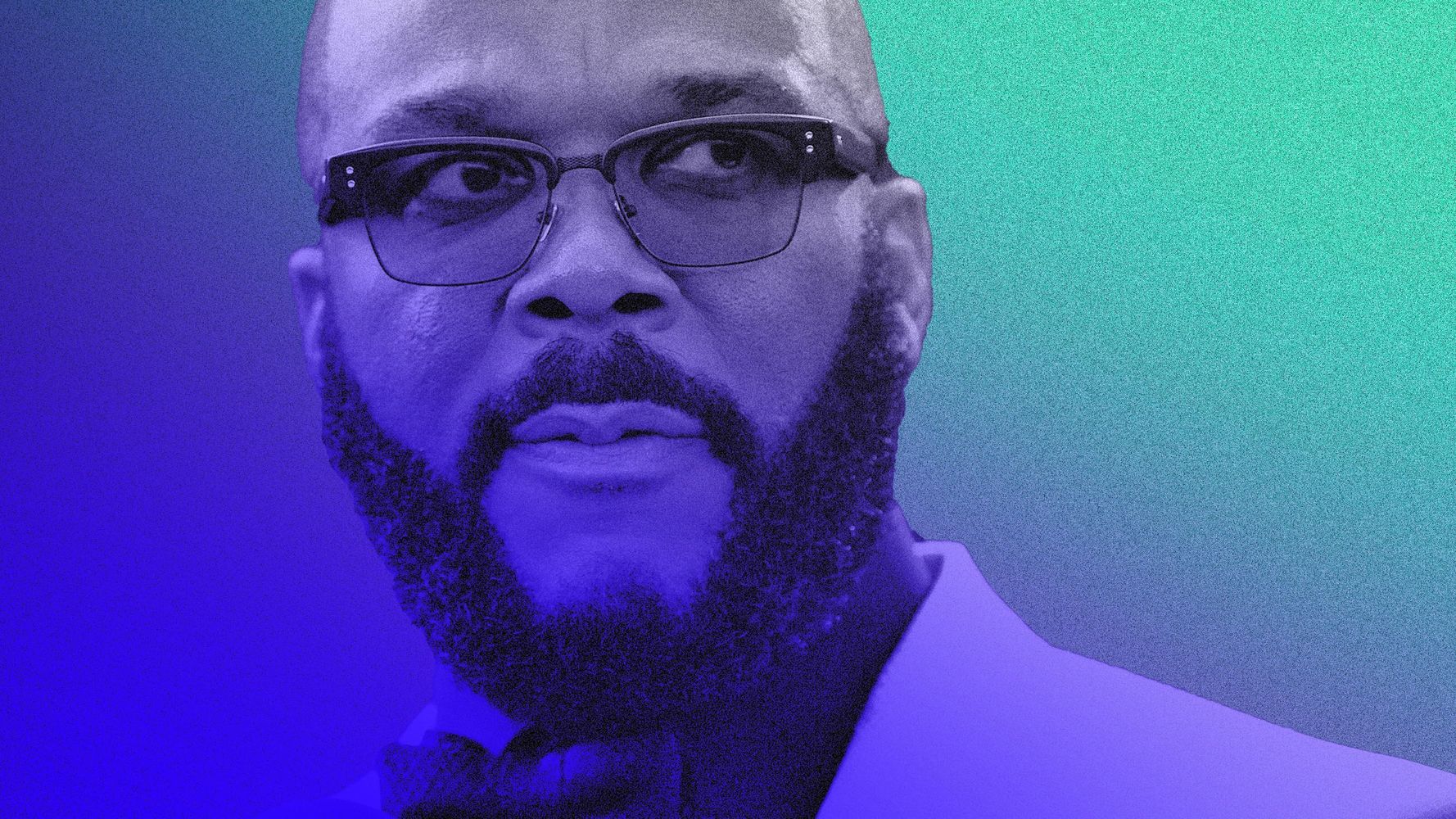[ad_1]
In early October, Tyler Perry made Hollywood yield the floor to Atlanta for the night. The world watched as Tyler Perry Studios opened its doors to Beyoncé, Jay Z, Oprah Winfrey, Spike Lee, Ava DuVernay, Samuel L. Jackson and many other stars.
A red carpet greeted the movers and shakers of Black Hollywood as they took their first steps in. The studios house 12 soundstages named after icons Diahann Carroll, Denzel Washington, Oprah Winfrey, Halle Berry, Sidney Poitier, Della Reese, Spike Lee, Harry Belafonte, Cicely Tyson, Whoopi Goldberg and Will Smith. It also features a replica of the White House. Perry even dedicated plaques of stars and a walk of fame to several actors in his previous projects, actors who rarely get their due credit from other Hollywood bigwigs.
The opening was nothing short of an ode to Black excellence. It was poetic. It was historic.
“While everybody was fighting for a seat at the table talking about #OscarsSoWhite, #OscarsSoWhite, I said, ‘Y’all go ahead and do that,’” he said at the BET Awards, just months before he opened his studio. “But while you’re fighting for a seat at the table, I’ll be down in Atlanta building my own.”
Perry did what he said he would. He didn’t wait for a seat. He built a table, one 330 acres in measure, on the land where Fort McPherson, a confederate army base, once was. He became the first Black person to outright own a major film studio lot. It’s located near Georgia State Route 166, the highway exit where he used to sleep in his car when he was homeless and hustling to break into the industry. And it’s big enough to fit Disney, Paramount and Warner Brothers’ studios combined.
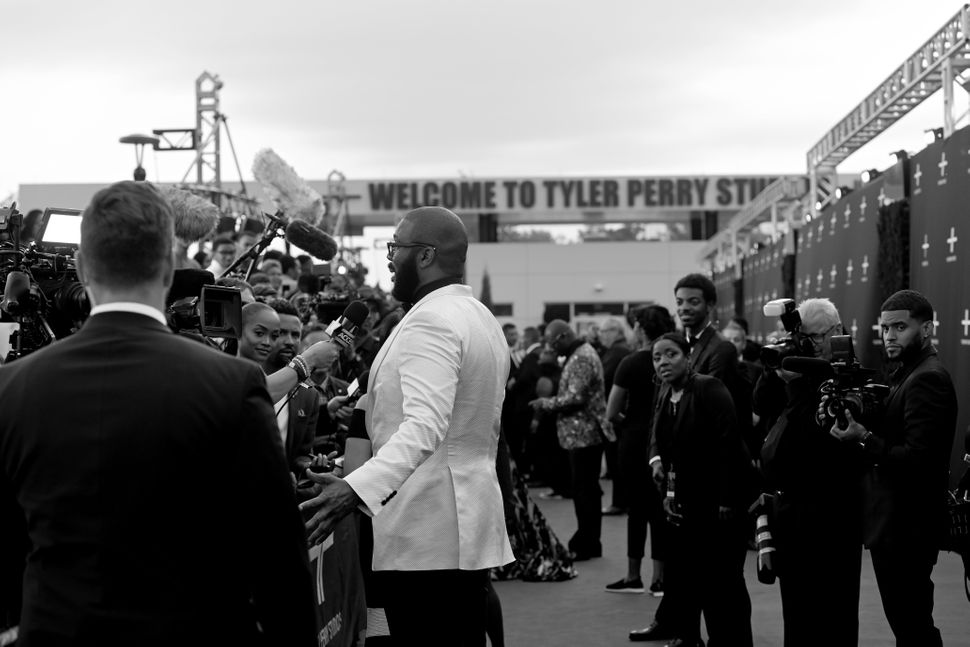
The opening of Tyler Perry Studios feels like a bright beginning to a new era in Black cinema and television. Of course, networks like BET, TV One, OWN and Bounce have long created platforms for Black productions on TV. For decades, there have been occasional surges in widespread interest around Black-centered productions. It happened in the ’90s with romantic comedies like “Poetic Justice” and “Boomerang,” coming-of-age films like “Boyz n the Hood” and “The Wood” and TV sitcoms like “Martin” and “The Fresh Prince of Bel-Air.” Now, change is happening on another level. Black creators are getting a bit more control over their projects and pushing Hollywood players toward a more equitable industry. More filmmakers and producers are making concerted efforts to bring new talent into the fold and speak out about the need for inclusion at every level. Directors like Lee, John Singleton and others did much of this foundational work early in their careers. Progression in the form of inclusion riders, pay equity and creating our own opportunities at the scale of Tyler Perry Studios are the fruits of their labor.
But progress is far from linear. While many people on social media celebrated Perry’s big moment, others criticized the on-screen narratives that helped him become one of the most influential men in Hollywood. His legacy building his empire is beyond admirable and so necessary, but much of the content and quality of his work, quite frankly, isn’t. The characters and storylines in his films have been criticized as one-dimensional at best and regressive at worst. Critics have pointed specifically to the portrayals of Black women in his films as stereotypical. Much of that heat has been directed at one of his most lucrative characters, a character he assumed for about 20 years when he suited up in a dress, fatsuit, wig, cigarette and gun: Madea.
Making Madea
Perry’s path to Hollywood began with a journal full of letters to himself. Those letters became his first play, 1992’s “I Know I’ve Been Changed,” a story about survivors of child abuse in which he played the main character. He poured all of his money into giving the show life. He planned for an audience, but only performed for mostly empty seats. His investment led to his eviction and subsequent homelessness. Six years after its debut, however, his play was selling out venues and he was gearing up for a tour that ran for two years.
The success of his first production propelled his second play, “I Can Do Bad All By Myself,” which featured Mabel “Madea” Simmons. The birth of the pistol-toting, foul-mouthed grandma, played by the producer himself, was prominent in many of his productions and based on the women in his own life, including his mother and aunt. The character undoubtedly helped build his loyal fanbase and launched Perry into a league of his own. In March, Forbes reported that the Madea franchise has made $523.52 million at the box office domestically.
In an essay for the New York Times, Perry wrote that he noticed very early on why people were so drawn to Madea. He said that she helped a lot of people in the Black community, including his own family, discuss issues that were considered taboo.
“I was blown away that somehow this ridiculous-looking 6-foot-6 guy in a dress had found a way to do for this audience the same thing that I had done for my mother,” he wrote. “I could lift them with humor and use that laughter as an anesthetic and talk about really deep, sensitive issues that were destroying so many of us — things like rape and molestation and the inability to forgive.”
The playwright only intended to keep her for one show, he told MTV News, but “the fans wouldn’t let her go.” Madea’s antics ― usually sandwiched between heavy-handed lessons in morality and Christianity ― have won the hearts of many. But her image is seen by others as stereotypical. In 2009, Black film historian Donald Bogle told Entertainment Weekly that Madea is “mammy-like.” He added, “If a white director put out this product, the black audience would be appalled.”
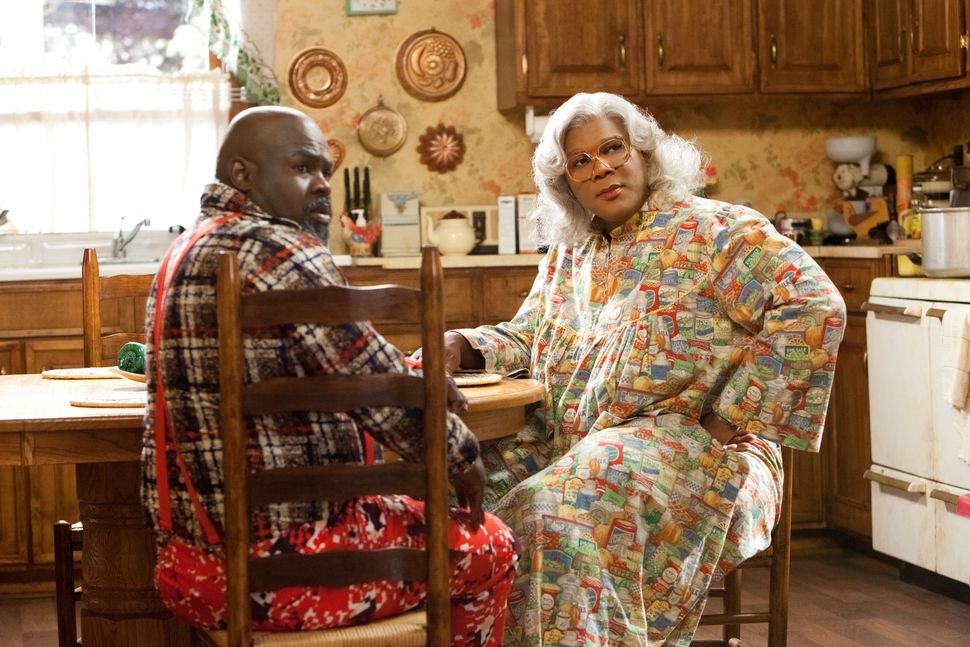
Other Black directors have been critical of the filmmaker. Lee told Black Enterprise in 2009 that his work is “coonery buffoonery” and that despite breaking records at the box office “we can do better.”
“The man has a huge audience, and Tyler’s very smart. He started out with these plays, and church buses would pull up, packed,” Lee said. “But at the same time, for me — just, the imagery is troubling.”
Robin R. Means Coleman, vice president and associate provost for diversity at Texas A&M University, said she understands why some people were less celebratory than others about the opening of Tyler Perry Studios. The strides he’s made in business and history don’t absolve him from critique. However, she said she sees a maturing in Perry as he’s begun to decenter himself and slowly move away from stereotypical images. Earlier this year, he retired Madea for good, sending her off with film and a farewell stage play tour.
But the controversy doesn’t stop at Madea. It’s also the constant use of abuse, illness and plight consistently being weaponized against Black women in his films. Women frequently don’t have fully realized lives, their characters often too dependent on men and their companionship.
A New Era?
In his 2013 film “Temptation,” the adulterous Judith, played by Jurnee Smollett-Bell, is diagnosed with HIV. She becomes a drug addict, ages excessively and gains a limp, all ridiculous plot devices as punishment for cheating on her husband. In 2018’s “Acrimony,” starring Taraji P. Henson, the storyline brushes past protagonist Melinda’s mental illness and paints her as a ride-or-die wife who loses everything for her man, only for her to attempt to kill his new lover when he finds success and riches after their divorce.
Coleman said much of Perry’s work leans on a male savior complex.
“Women are troubled when they leave men, and it’s a turn so that women are reliant on men for their happiness and success and their thriving and when they leave the man, when they leave the fold, which is deeply tied to a patriarchal version of Christianity, they suffer,” Coleman said. “One cannot ignore how he built his fortune, in a lot of ways on the backs of narratives that exploit women’s suffering, that offer up narratives of abuse and suffering when he could’ve been offering up narratives of thriving and success and leadership and something that is really whole and contributory and authentic.”
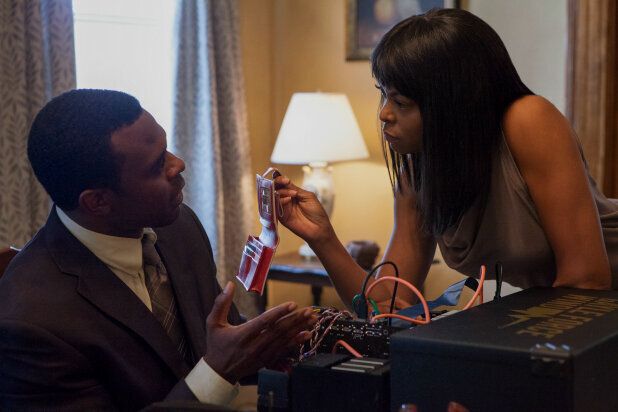
Similar approaches helped Perry build the foundation for his empire, through which he’s been able to create 17 films, 20 stage plays and seven TV shows. His TV shows, like his other productions, have gained a cult following. One of his most successful early shows was “House of Payne,” a sitcom based on characters in his plays, which aired on TBS from 2006 to 2012. Aside from that and “Meet The Browns,” most of his shows have aired on Black networks. In 2012 while the OWN network was struggling with ratings, Perry signed a multi-year deal to bring more scripted TV into the fold. His soap opera “The Have And The Have Nots” has become the network’s highest-rated scripted show. He now has a deal with Viacom to annually produce about 90 episodes of shows for BET, which has had trouble sustaining viewers for its scripted programming.
While bringing in stellar ratings for these networks, Perry was also helping Black actors and crewmembers elevate their profiles. He has employed hundreds of Black actors and crewmembers who may have not gotten a fair shot at landing a job in Hollywood otherwise. He also has a reputation for paying actors fairly. Henson said he was the first to pay her half a million for a role.
In late October, Perry premiered two new shows on BET, “Sistas” and “The Oval.” Both are underwhelming so far. “Sistas” revolves around four Black women who share struggles in navigating love and dating. The show seemingly hopes to be in the spirit of “Living Single,” “Girlfriends” and “Insecure,” however it misses the mark in its quality. The themes explored — like dating, sisterhood and healthy relationships for millennial Black women — have promise, yet the script often feels heavy-handed and the production is inconsistent. One cringeworthy example is when one of the leading ladies goes to sleep with bundles and wakes up with micro Fulani braids. Even if it was meant to translate as a braided wig, it was bad.
“The Oval” follows the first family and their staff beyond politics and into their personal lives. The show feels like it’s trying extremely hard to fill the void of Shonda Rhimes’ “Scandal.” It is even more outrageous than “Sistas” as it opens with a poorly produced scene of the president and first lady in a domestic brawl just hours before the Inaugural Ball. Things go tragically downhill from there as viewers are bombarded with farfetched and low-quality scenarios of the behind-the-scenes drama at the White House. It has far less promise for a well-rounded plot and nuanced character development than “Sistas,” but it is currently the No. 1 new drama on cable television. “Sistas” follows at No. 3. Despite initial criticism on social media, the series premieres attracted a combined 2.9 million viewers and engagement was “at an all-time high on BET,” according to a press release.
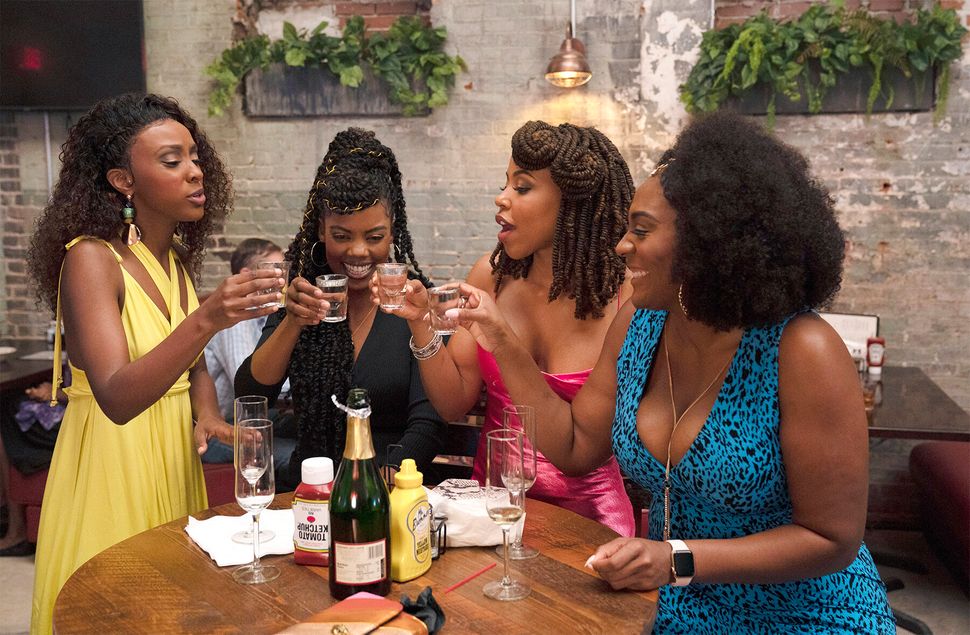
In true Tyler Perry fashion, “Sistas” and “The Oval” star a range of new and up-and-coming actors. Among them, Kron Moore plays Victoria Franklin, the villainous first lady in “The Oval.” It’s Moore’s first big break in 16 years. The Detroit native was gearing up to quit acting entirely and go into real estate to make a living.
“There’s a lot of rejection in the industry,” Moore told HuffPost. “Tyler has opened the doors for the underdog and those people who are often overlooked by mainstream Hollywood. He just gives us these opportunities that would give these chances to grow and to flourish and to be seen on a larger platform. And so I’m so grateful for that.”
Despite the questionable quality of these recent productions, Tyler Perry Studios shows great promise to create opportunities for not only Black people in front of and behind the camera, but also the city of Atlanta. Since the studios opened, Perry has expressed a desire to use his studios as a hub for building community. Outside of the filming and production process, he’s planning on using parts of the massive space to help others. He plans on building a compound at his studios “for trafficked women, girls, homeless women, LGBTQ youth who are put out and displaced… somewhere on these 330 acres, where they’re trained in the business and they become self-sufficient,” he told CBS This Morning.
It’s also a space for other filmmakers and their projects. “Black Panther” was the first film shot at his studios. “Bad Boys for Life” and “Coming 2 America: Quest” are among the projects currently filming there. Both the next Democratic presidential debate and the 2019 Miss America Pageant will be held at Tyler Perry Studios.
He’s putting his studios to some damn good use.
“You can hold his feet to the fire, and want him to do well at the same time, because the whole principle is, do better. I just need you to do better, and here we’ll help you by identifying the ways and areas you can do better,” Coleman said. “And so pay equity would be one, representation would be one. The narratives about women, that’s a principle one. Because this is a great opportunity for him, and you want him to get it right. It’s a great opportunity, perhaps, for Atlanta, and you want him to get it right.”
REAL LIFE. REAL NEWS. REAL VOICES.
Help us tell more of the stories that matter from voices that too often remain unheard.
[ad_2]
Source link

